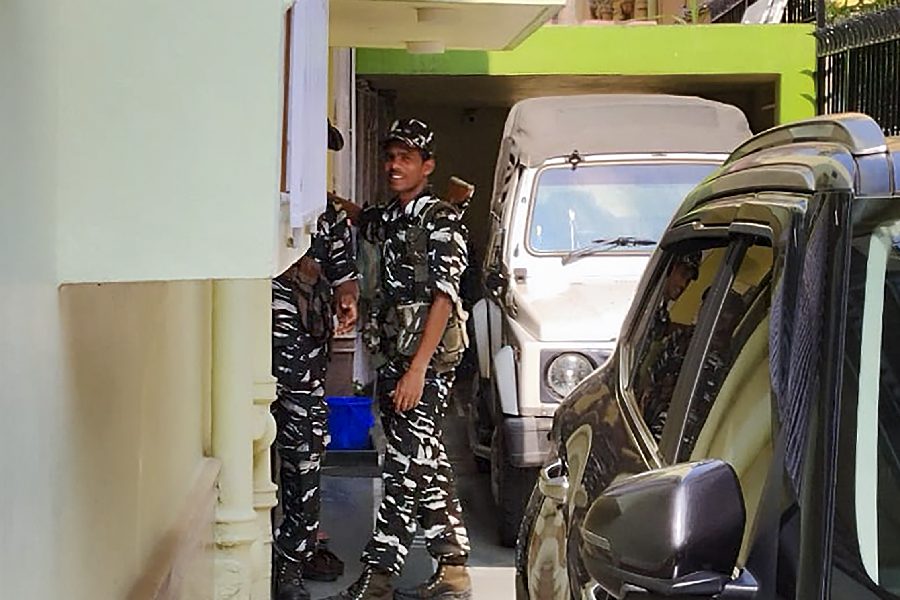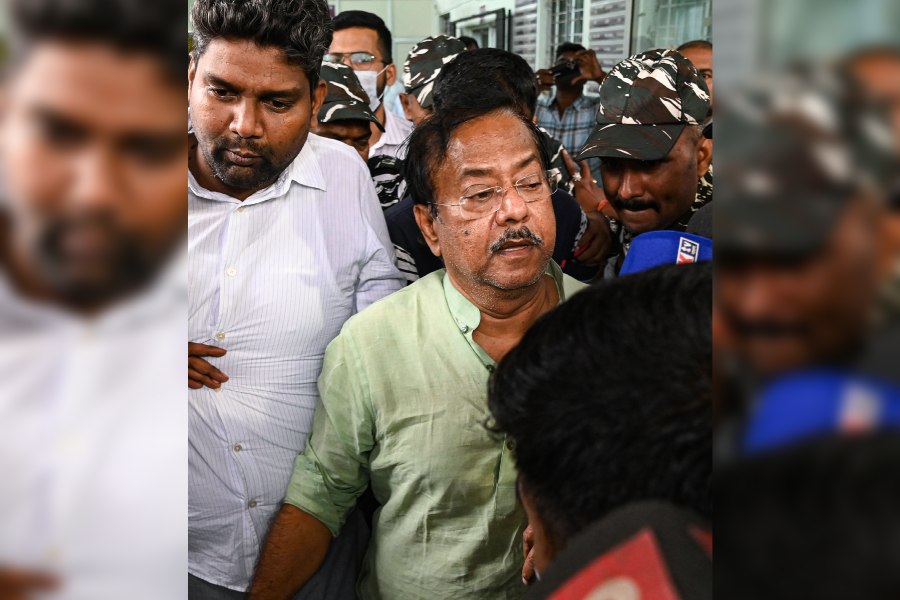In the wee hours of October 27, a minister in Bengal was arrested after being grilled by the Enforcement Directorate for over 20 hours. So intense was the operation to unearth details of a scam involving the illegal, open market sale of subsidised food grain meant for the public distribution system, that Jyotipriya Mullick, the former Bengal food minister currently holding the forest portfolio in the Mamata Banerjee cabinet, collapsed in court and was move to a private hospital where he currently remains admitted. Once released from hospital, he would be taken in a 10-day ED custody for further interrogation.
The scam that investigators and Opposition leaders claim is worth no less than a thousand crores has been brewing for over a decade, gaining momentum during the Covid years.
How was the con pulled off? Who all were involved? Can the state government absolve itself by merely claiming that the probe is a witch hunt launched by the Centre to settle scores with an adversary-run state government? Here's a run down.
How was the ration scam engineered?
The modus operandi of the corruption was pretty straightforward. The Centre sends procured wheat grains to government-enlisted rice mills and flour mills for crushing and converting them to atta (powdered wheat) and their subsequent distribution from fair price ration shops under Pradhan Mantri Garib Kalyan Anna Yojna to beneficiaries.
Government distributors pick up the wheat from the millers and supply them to ration shops. Each distributor has an area-specific zone of operation and the number of shops they can distribute the grains is also prefixed. The volume of grains distributors can procure from the mills is also specified and is mentioned in their delivery/supply slips.
It is at this juncture that the first stage of corruption sets in. Distributors, in connivance with millers, pick up less than the specified volume from the mills for distribution to ration shops. Investigators reveal that the deficit procurement ranges from 20-40 per cent of the specified volume.
The amount left behind is then sold in open markets at market rates and the proceeds of crime are shared as commission between members of the syndicate.
What is the alleged role of minister Jyotipriya Mullick?

Security personnel stand guard outside West Bengal minister Jyotipriya Mallick's Salt Lake residence during a raid by the Enforcement Directorate PTI
Mullick held the office of the state’s food and supplies department for a decade from 2011 to 2021. It was during this time period that the alleged corruption took place. The ED has claimed in court that not only did the scam take place under Mullick’s watch, it has evidence that he was a direct beneficiary and that played his part in laundering the proceeds of the crime.
Any clues on how the proceeds of the crime were distributed?
According to a list provided by BJP leader Suvendu Adhikari, four flour mills in the state were directly linked to the corruption racket and another seven were indirectly involved.
The second stage of corruption, of course, involved laundering the crime proceeds through a web of shell companies and legitimate businesses by a racket of scamsters and bringing the money back into the mainstream economy. Members of the syndicate and beneficiaries of the corruption, according to the investigating agency, include political leaders, food department officials, mill owners, distributors, middlemen and their relatives, in some cases, even ration shop owners.
Who is Bakibur Rahaman and how is he linked to minister Jyotipriya Mullick?
Arrested on October 13 by the Enforcement Directorate after a marathon 53-hour search, seizure and quizzing session at his flat in Kaikhali in the northern fringes of the city, Bakibur is believed to be a vital link in the multi-crore ration scam.
Rahaman began his career in 2004 by setting up NPG Rice Mill in North 24 Parganas, an establishment which the ED claimed in court on Friday was actively involved in siphoning off wheat in a sustained manner and responsible for his meteoric rise. Within the next two years, Rahaman owned of three more companies, two of them in the real estate sector. By 2020, he was the director of at least 13 companies.
Besides his companies, Bakibur also owns at least two hotels in Calcutta and Bangalore through his company NPG Hotels Private Limited, nursing homes, bars and restaurants, recreational and sporting activity businesses, foreign cars and a number of flats, including two apartments in Dubai, the ED has unearthed.
The agency has also found out that Rahaman and his relatives jointly own 1,632 cottahs of plots spread across the state but mostly concentrated in North 24 Parganas and Beherampore. So far, Bakibur’s properties have been identified across 95 locations in the state and are jointly worth close to Rs 100 crores, the agency claims.
Bakibur, the ED claims, indirectly controls three bogus companies – Shree Hanuman Realcon Private Limited, Gracious, Gracious Innovative Private Limited and Gracious Creation Private Limited – all of which were set up in 2008 and were registered to an address on the Ground Floor of an apartment on 100/75, Jessore Road in North Calcutta. The said apartment is now locked.
Jyotipriya Mullick’s wife and daughter are former stakeholders in the company, the ED submitted in court. The companies were later passed on to Abhishek Biswas, Bakibur’s brother-in-law and ceased to operate after routing Rs 12.06 crore in the form of fake security premium through them.
Bakibur, the agency maintained, provided Rs 8 crores to Mullick in the form of unrecovered loans from these three company accounts.
During search operations at Mullick’s residence, company rubber stamps of M/s AJ Agrotech and M/s AJ Royal were recovered, both of which had addresses in a remote corner in Bankura. Biswas laundered Rs 20.34 crores through the accounts of these companies which Mullick’s chartered accountants have identified as fake, the ED claimed.
The agency, referring to Mullick’s chartered accountants and Bakibur’s custodial statements, claimed that the irregularities were carried out on instructions of the minister.
Besides, as proof of Bakibur’s proximity to Mullick the ED submitted in court, documents recovered from Bakibur’s residence showing that the businessman had initially paid for the air tickets for the minister’s wife, Monidipa, and his sister-in-law, Tapati, for their trip to the US which was later canceled.
Two sets of WhatsApp chat histories from January 20, 2020, recovered from phones belonging to Rahaman’s close associates were also produced before the court by the agency. In the first set, the sender confirmed Bakibur that he had paid the MIC (then minister-in-charge of the food department Jyotipriya Mullick) Rs 68 lakhs as a loan (never returned since). The other chat confirmed the arrested businessman that Rs 12 lakhs were paid to the minister, again shown as a loan.
Bank accounts opened in the names of domestic helpers at the minister’s residence were also used to park and redirect corruption money, the central agency claimed.
How are Jyotipriya Mullick’s wife and daughter linked to the scam?
Besides serving as former directors of the three bogus companies operating out of a Jessore Road address, Mullick’s wife Monidipa and his daughter Priyadarshini are in personal possession of significant assets. ED lawyer Edulji Phiroze said in court, “As per his affidavit for the state Assembly elections filed in 2016, Jyoti Priya Mallick declared Rs 45,000 cash in hand for his spouse. But within a span of one year, Rs 6 crore was deposited in her bank account.”
In addition to Rs 6.03 crore in the savings account of Monidipa, a homemaker, the ED also found another Rs 3.79 crore deposited in the account of Priyadarshini Mullick, a college teacher, in the period 2016-17.
Figures presented by Adhikari state that during the demonetization drive in 2016, Priyadarshini deposited cash to the tune of Rs 3.37 crores from her UBI account claiming them to be earnings from “tuition fees”. Her official annual income from her salaries, Adhikari claims, was Rs 2.48 lakhs that year.
Cash deposits in Monidipa’s account during the same period were Rs 4.29 crore, Adhikari said.
While claiming these were proceeds of the ration scam, Adhikari also pointed out Priyadarshini’s income from other sources for the income tax assessment year 2018-19 which was shown to be Rs 11.2 lakhs. The same income head for Monidipa for AY 2020-21 was shown as Rs 19.97 lakhs, the BJP leader claimed.
The ED has taken steps to freeze the bank accounts of both Monidipa and Priyadarshini.
Any other businessmen whose names have come up in investigations?
BJP leader Adhikari has claimed that one Kalidas Saha and another Mahendra Agarwal are also linked to the alleged scam. Adhikari maintained that both ran webs of shell companies to launder money. Saha, according to Adhikari, was recently found to have been illegally storing truckloads of PDS ration in his godown.
Agarwal, on the other hand, served as the principal broker for the minister who handled the siphoning of food grains from the PDS chain, Adhikari claimed. It was Agarwal who then reinvested the money in real estate projects, the BJP leader alleged, adding that Agarwal has “made himself a silent partner in several mills” that receive work orders from the department and charge a cut of Rs 100 per quintal of food grain.
How long has the scam continued?
Investigators say the theft could be going on for over a decade. But operations reached their height during the Covid-19 years when the Centre sent 5kg food grains to nearly six crore beneficiaries of the state during the nationwide pandemic lockdown. The Centre subsequently extended foodgrain scheme till mid-2021.
What could be the value of the scam?
Some estimates put the scam volume at over Rs 1000 crore. Congress leader Adhir Ranjan Chowdhury has claimed that the ration scam far exceeds the volume of the recruitment scam which has already rocked the state.
What evidence is the ED still holding on to?
During raids and searches at the residence of one of Mallick’s close aides, Abhijit Das, in Howrah the agency seized a ‘maroon diary’ labeled ‘Baluda’ (the minister’s nickname) containing transaction details related to the scam. The details apparently pertain to names of those who received money during the purported scam. ED has also confiscated Mullick’s phones and their forensic examination could provide further insights into the corruption, it has said.
How has Bengal's ruling party, Trinamul Congress, reacted to its minister's arrest?
Chief minister Mamata Banerjee has already thrown her weight behind Mullick and lambasted the BJP and the agencies for conducting raids at the minister’s residence, even threatening to lodge FIRs against both if the minister’s health condition deteriorated under agency pressure. But that was before Mullick’s arrest and the subsequent claims of the ED in court. Both Banerjee and the TMC have since refrained from making any further statements on the matter. The buzz, party sources claim, is that it wants to go slow on the matter for the time being. All eyes are now on the next cabinet meeting, not scheduled as yet, and what message Banerjee would share with her party leaders.










